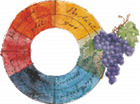Manifesto of the Vignerons of Europe 2009
“The vigneron personally takes care of the vineyard, the cellar, and the sales.
The vigneron’s wine is alive, gives pleasure, and is the child of its territory and thought—an authentic expression of a culture.
The vigneron considers the consumer a co-producer.
The vigneron protects and shapes the landscape with respect for biodiversity and the culture of their territory, which they tell and enrich.
As a farmer, the vigneron assumes responsibility for preserving and improving soil fertility and the balance of ecosystems.
The vigneron commits to renouncing the use of artificial and synthetic molecules and organisms with the aim of protecting all living beings.
The vigneron manages limits in all their commitments, seeking the optimal, never the maximum.
The vigneron takes responsibility for their activity in respect of the environment, consumer health, and the destinies of their community and the earth.
The vigneron commits to creating and nurturing relationships with other vignerons, farmers, food producers, chefs, universities and research institutes, educators, and citizens in their community and worldwide.
The vigneron practices transparency: they say what they do and do what they say.
The Vignerons d’Europe gathered in Florence ask national and European authorities not to hinder their work with regulations suited to industry but not to their particularities.'
This is the manifesto presented in Florence on December 7, 2009, developed by all those who took part in the international Montecatini meetings: farmers and viticulturists, oenologists, agronomists, organic, biodynamic and sustainable associations, Slow Food officials, and others.
Most of the producers and technicians present were convinced supporters of organic and biodynamic farming, alongside a portion of producers still enchanted by conventional viticulture and oenology (those who cannot do without synthetic chemistry).
The difficulty of reconciling all the souls of this heterogeneous and wonderful movement, just starting, led to drafting a document (certainly not definitive) with many intentions and some fundamental choices. We tried to distinguish between the strength of numbers, necessary for any movement wanting to make an impact, even politically, and the refusal to compromise on essential and probably existential issues.
In our view, the distance from synthetic chemistry needed to be further emphasized; a clear trend had to be identified, starting from being organic farmers and naturally progressing towards secular, free biodynamics capable of making the agricultural human the protagonist of their own actions.
The vast experience and knowledge of farmers and technicians producing in this way today can certainly guide those needing to be accompanied from chemical viticulture and oenology to biodynamic or at least organic emancipation.
We will continue to stand alongside the movement, in its practical applications, with our concrete and scientific example, with our farms, so that the path already taken by the vignerons’ movement towards the agriculture of the future will be increasingly illuminated and explicit.
The Reason Behind This Website
On carelessness and imitations







